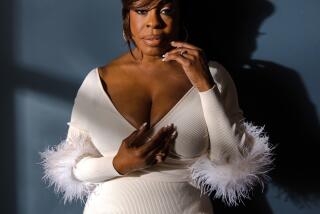Hamel Looks for a New Life on Big Screen
- Share via
Co-starring in a multiseasonal hit series can be a kind of sweet captivity. It can set you up for life financially. It gives you a quantity of under-fire acting experience you couldn’t get in decades anywhere else.
Being a series star can also give you an image that sticks with you like a tattoo and is almost impossible to erase when you want to play someone else.
For seven years Veronica Hamel was Joyce Davenport, the sharply intelligent and independent public defender on “Hill Street Blues.” She has now resurfaced as a doctor who becomes the new woman in Alan Alda’s life in “A New Life.”
It’s a useful transition because in effect all she has to do is change the diplomas on her office wall and cope with cardiac arrest instead of unlawful arrest. But the transition from the small screen to the big one is never quite that simple.
As some TV personalities have painfully discovered, their image on the large screen suggests a transparency that has been enlarged too many diameters and become ghostly pale.
But Alda’s script makes Hamel a mature woman (Hamel is 43) who, having consecrated the hard young years to establishing her professional career, now hears the biological clock beating like a tom-tom and wants a husband and a child, in that quick order.
It does not give too much away to say that Hamel handles a childbirth scene, one of film’s most durable (or unendurable) cliches, with a fine, sweaty believability. She makes it quite clear that knowing all about birthing babies doesn’t ease the pain.
Hamel began by a happenstance that was as near to the Hollywood soda fountain syndrome as Philadelphia could manage. She was a secretary, with a vague and, as it turned out, unworkable dream about becoming a child psychologist. She had put in a few months at Temple University.
Her firm needed a pretty lady to pose for an advertising brochure. A woman at the photography session urged Hamel to try modeling. She did, first in Philadelphia, then at the Eileen Ford Agency in New York, taking acting lessons on the side and eventually working far off Broadway in a production of “The Big Knife.”
She toured dinner theaters with Hugh O’Brian in “Cactus Flower.” Her agent suggested that careers moved faster in Hollywood, and she came west, with no specific prospects in hand, in 1976.
She did supporting parts in “The Rockford Files” and other series, appeared in the miniseries “79 Park Avenue” from the Harold Robbins novel and made a couple of movies, including “Cannonball” and “Beyond the Poseidon Adventure.” She was offered “Charlie’s Angels,” Hamel says, but rejected it as not likely to go anyplace.
“Hill Street” was a piece of good luck that followed bad.
“I went off to St. Louis to do ‘The Rainmaker’ on stage, and I was fired. Period. Flat-out fired. It was humiliating and I came back crushed. The script of the first ‘Hill Street’ was at the house, but I really only wanted to stay in bed. I’d lost all confidence in myself. I didn’t want to go on--but you do.”
She went to read for “Hill Street.” “I did it not to get the job. I didn’t think I wanted the series but I had to prove something to myself.”
The producer, Steven Bochco, told her later she was the 60th actress he’d read for the Davenport part. She took a deep breath and auditioned for a roomful of “Hill Street” staffers and there went the next seven years of her life.
“A steady gig for seven years, that’s a rare thing,” Hamel says. “It paid for my house and it’s a privilege to do a show you’re proud of. There were limitations to the Davenport character; the humanity went elsewhere, but being the provocative legal lion had its moments.”
She now has a production company of her own (in the later Hollywood tradition) and among other things would like to direct a documentary about 5-year-olds, thus circling back toward her early hope of working with emotionally disturbed children.
Some years ago Hamel realized she couldn’t remember who it was who had made the casual suggestion that she try modeling. She called her old firm in Philadelphia and learned it was a woman named Josephine Lipton. “I called her and said thank you, and she said, ‘My dear, I’ll wave a magic wand over you,’ and I think she has.”
More to Read
The complete guide to home viewing
Get Screen Gab for everything about the TV shows and streaming movies everyone’s talking about.
You may occasionally receive promotional content from the Los Angeles Times.




